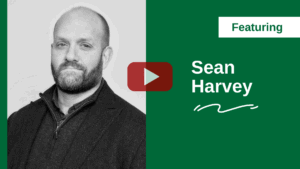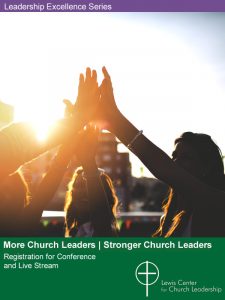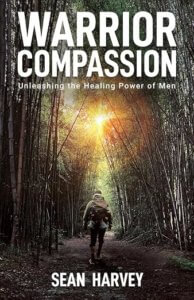
How can churches engage men in challenging cultural norms of masculinity? In this episode we speak with Sean Harvey, founder of Warrior Compassion Institute. He empowers faith communities to engage men by fostering spaces of vulnerability, curiosity, and connection—meeting men where they are, while challenging cultural norms of masculinity with compassion and creativity.
Listen on Apple Podcasts | YouTube Music | Spotify
Watch on YouTube

Read in-depth interview
- Transcript — Click or Tap to Read
-
Announcer: Leading Ideas Talks is brought to you by the Lewis Center for Leadership of Wesley Theological Seminary in Washington, DC. Subscribe free to our weekly e-newsletter, Leading Ideas, at churchleadership.com/leadingideas.
Leading Ideas Talks is also brought to you by More Church Leaders | Stronger Church Leaders. Learn strategies to identify and support new leaders and build and maintain effective ministry teams. The More Church Leaders | Stronger Church Leaders Video Tool Kit resource helps clergy and lay leaders discover a more fruitful way of being in ministry together, Learn more and watch video previews at churchleadership.com/shop.
How can churches engage men in challenging cultural norms of masculinity? In this episode we speak with Sean Harvey, founder of Warrior Compassion Institute. He empowers faith communities to engage men by fostering spaces of vulnerability, curiosity, and connection—meeting men where they are, while challenging cultural norms of masculinity with compassion and creativity.
Jessica Anschutz: Welcome to Leading Ideas Talks, a podcast featuring thought leaders and innovative practitioners. I am Jessica Anschutz, the interim director of the Lewis Center for Church Leadership, and I am your host for this Leading Ideas Talk. Joining me is Sean Harvey, Senior Strategic Advisor and founder of Warrior Compassion Institute. Thank you, Sean, for taking time to speak with me about your work in the Men’s Soul Healing Movement.
Sean Harvey: Thank you so much. Thank you for having me.
Jessica Anschutz: Sean, your work seeks to help men facing challenges of identity, purpose, and connection. What inspired you to get involved in this work?
Sean Harvey: You know, it all started when I left consulting on Wall Street and an opportunity came along, like within two weeks of leaving my former position at Eileen Fisher, the women’s fashion company. And after going through an eight-month interview process on my first day, my two bosses sat me down and they said, “So Sean, we just want to acknowledge that you have proven yourself in the interview process. We now want you to stop proving yourself and learn how to be who you actually are. When we hired you, we hired you—when we interviewed you, you showed us your heart, and you showed us your polish. We hired you for your heart, and we wanna see less of your polish.” And I think that was, like, one of those, you know, pivotal moments and permission to start on the journey of going inward.
And I think, as I had the experience at Eileen Fisher, and I started noticing other men were having the experience, and in conversations with other men in the company—I have to mind—remember, Eileen Fisher is 83% women. So, it’s… so the 17% of the men in the company I was talking to, and they would often say something like, “You know, my wife said …” or “my girlfriend said …” And it usually went something like, “My wife said I listen differently. I’m more patient. I have more access to my emotions. I’m more creative. I’m able to solve problems differently ’cause of this environment. I stopped needing to be right all the time, and I started to be more curious. I started to have more patience with the unknown or with the gray. Didn’t have to be so concrete.” But what’s common with every man that I talked to was they would say they felt more comfortable in their own skin. And I said, “You know what? We have to bottle this up and take it out to more than the 200 men that are in this company.” And that’s really where it started.
Jessica Anschutz: Great. So, share with our listeners about the Warrior Compassion Institute.
Sean Harvey: So, um … Warrior Compassion Institute is really focused on helping to disrupt the quiet crisis of men, and what I like to call “warrior cultures” or “male dominated cultures.” And so, police, military defense, government, finance, tech, energy, and how do we create men’s healing and transformation in organizations now? When I was at Eileen Fisher, I was the Head of Personal Transformation and Wellbeing for the company. So, I had exposure and experience with creating systems-level personal transformation experiences that are scalable. And I noticed that men would, once they got a taste of it, would say, “I want more of this.” And so, that’s one piece. The other piece is also working with faith communities, spiritual communities, to be able to look at new strategies for engaging men, especially with the decline of men in many faith communities. How do we invite and create what I like to call “church without walls?” That’ll provide some variations where men can get … and the example I use, I’ve created men’s soul adventures. And with men’s soul adventures, where outdoor adventure meets deeper male bonding, meets soul connecting conversations. But any variation of “What are we doing to create different types of experiences—this idea of church without walls?” And getting into the psychology of men, of what’s going to bring them together and also speak to the deeper yearning of community and connection.
Jessica Anschutz: Why do you find men are looking for that community and connection?
Sean Harvey: I think time and again, we’re seeing this epidemic of isolation and loneliness, and I think isolation in itself is sort of a breeding ground for many maladaptive behaviors, including movements to radicalization or extremism. And not that men often are seeking this out consciously; but I think there’s also something that’s like within them—that’s a yearning. So even if they can’t articulate or have the words for it, there’s still something that’s missing. And often that thing that is missing is a deeper sense of connection; a deeper sense of belonging and acceptance. And so, it’s … from my experience, it’s often spoken of in many ways, but at the … at the end of the day it comes down to, and I think it’s just a human need—regardless of gender—of our need or desire, our yearning for some, for a deeper connection. And I think, especially in the era of social media, I think we’ve been operating in this place of faux-intimacy, faux can … you know this level of connection that actually doesn’t meet those needs; and so, that seeking for something deeper.
Jessica Anschutz: I am really impressed with your work and your passion for it. I truly think it is your vocational calling. As we think about faith communities, and the ways in which they are engaging men, what words of advice do you have for them to help them meet these yearnings that men have?
Sean Harvey: I think the first thing that comes to mind is ask. You know, it’s … one thing is, I think, looking at what’s been working, what hasn’t worked. What’s created engagement, what hasn’t? What’s created more of a sense of being there, but is that really creating the type of engagement around community, around both spiritual formation, spiritual community, and connection, and deepening to that soul-connection? That, I think, is really the deeper yearning. And so, I often say, “Our soul is speaking in ways that our minds can’t hear, but it’s still calling us into those places.” And so, I think, one, to ask. Two, to get creative and think about it from a man’s perspective. What is going to be the types of experiences that, you know, fit into their life? When we do soul adventures, it’s a two-to-three-hour experience. It’s not a weekend retreat. Those are important as well, but what fits into your life that has consistency; that has an opportunity that you can just see men over time and build those relationships organically.
And, you know, when we … when I started Men’s Soul Adventures, I started it in Washington, D.C., and I just put it out on Meetup. I didn’t know how many people would come. I didn’t know if it was gonna take off, and 52 men signed up in the first 24 hours. Within three to four months, we had about 180 men. I went to four other cities, and within three days, we went from 180 to 330 men. And then I got smart, and I started asking, “so why a soul adventure?” And it really broke down into thirds. A third said they just wanted a different type of adventure, and it sounded cool. A third said they wanted a … a third said that they wanted just deeper connections with other men. And in writing my book, one of the things that I found was one of the greatest fears for men is to be vulnerable in front of other men, right? So, to be able to have those deeper connections. And a third, they just started, they had questions around … they just had practical questions around spirituality that they just wanted a place to ask. And I started coining the term, “practical spirituality for dudes.” And just make it accessible; you know, not make it overbearing of dogma, but really just a natural invitation to say, “let me look at myself in a deeper way. Let me look at myself in ways that, you know, see beneath the ego, and to help me discover my own truth between and beneath the protective layers, and to let other men see that in ways that real connection and deeper connection is possible.”
Jessica Anschutz: That’s really great words of advice. As you think about your work with men, if a congregation were going to start a men’s ministry, what are some of the key themes that you would want them to keep in mind?
Sean Harvey: One, I would … and I would really look at and be honest about the state of men today, and to look at the data, to look at the research of, “What is the state of men?” And, one of the statistics I saw, men have declined in faith communities by about 20%. To get curious about what that is. We often, I’ve helped with faith communities on their strategic plans and their visions and strategic plans. You know, as part of that, when we look at congregate engagement, it’s really easy to look at the masses and not necessarily look at what is engaging or disengaging men. So, I would say one: look at the data.
Two: If you’re forming a men’s ministry, let the men tell you what they want. So, engage a conversation. Often when I go into any organization, I start with “Let’s just have a fireside chat,” with the men and see what starts to rumble under the surface of what men want to talk about, of what want men wanna explore, and what questions they have around faith. And often, it’s what questions they have around how faith is applied to modern day living.
And so, what is applicable to today and where they can see themselves in it. And then, I also think there’s an aspect of, “Let’s be honest and real about religious trauma,” and what people, what folks, might be carrying from the past that they’re ready to let go of. And how can the church or the community, faith community, meet those needs for today? And then, also take a trauma informed approach to honor where men are. And then, I think the other piece is whatever you do, create it with consistency so that men have some space, some place for … for vulnerability, for community, and for ongoing conversations.
Jessica Anschutz: Thank you for those insights in engaging men and building men’s ministries. When you think about your work with the Warrior Compassion Institute, what lessons have you learned now that you wish you knew when you started that may be insightful for churches as they seek to engage men in new ways?
Sean Harvey: You know, it’s something that I’d known, but it was something that really came apparent as a facilitator in this work. One of the best things we can do is become quiet and invisible and hold space, as opposed to being the stage, on the stage and being the expert on men. I often say I’m really holding space for men, and it’s less about what I know and more about the space I can hold for the wisdom that’s already in the room and for men to talk about their experiences.
I remember someone asked me once, they’re like, “What is your definition of men and what do you tell men?” And I said, “I don’t, and I don’t know.” Because I think we all have different experiences. We have different relationships to our masculine, to our feminine we, or to our inner energies. We have influences from faith traditions that also inform how we think about what it means to be a man or not. So, I think the biggest thing we can do, and it’s just been reinforced time and time again, is to be in the inquiry and engagement—in an inquiry as opposed to a telling, of one: what does it mean to be a man? And that so many men have so many different definitions of what it means, and there’s some commonality. But how do I, how have I taken this on? How have I internalized my relationship and this conditioning of what it means to be a man of masculinity.
I think the other part that’s so critical is the power of intergenerational connections among men. And one of the things I’ve done in the men’s circles I’ve created is to really talk about… and one group, I had a group from the youngest was 27 and the oldest was like 67, and I had them talk about in small groups their stories of what did their mentors learn about masculinity? What did they learn about masculinity and how was it shifted for them in their lifetime? Now imagine a 27-year-old and a 67-year-old talking about those influences, and what shifted, and that opportunity to say, one: I understand that I’ll never know as a 27-year-old your experience; but I also know I can’t apply what I know around masculinity to you because we have had such different lived experiences, and that honoring of each other’s experience. And so, I think that’s another piece is creating a space for honoring our differences of experiences, as opposed to judging, or wronging, or saying one is better than another.
 More Church Leaders | Stronger Church Leaders helps clergy and lay leaders discover a more fruitful way of being in ministry together. This video tool kit provides practical strategies to identify and support new leaders and build and maintain effective ministry teams. Learn more and watch video previews.
More Church Leaders | Stronger Church Leaders helps clergy and lay leaders discover a more fruitful way of being in ministry together. This video tool kit provides practical strategies to identify and support new leaders and build and maintain effective ministry teams. Learn more and watch video previews.Discover more video tool kits plus adult Christian studies at our online store.
Jessica Anschutz: I can imagine how powerful the experience is when people are able to share their stories with one another and see similarities in, in differences, but recognize that each story is valid in that way. As you think about helping men with their looking at identity and purpose and connection, what are the challenges that you encounter in doing this work?
Sean Harvey: I think one, I often say men will invest in professional development before they invest in personal growth. I think one, we’re operating from a place that there’s stigma, access, and availability challenges; I think, just in the nature of our conditioning, and in the nature of even maybe some of our biology, and our needs and our permissions. And there’s often many more spaces for women, in particular, to be able to have space to come in and connect, as well as do more of the inner work. For so many men, there’s stigma around this; will it reflect weakness? Two, can I be vulnerable, and am I willing to be vulnerable? And three, there’s just fewer options, and I think there’s fewer options that fit into your life. And I often find that spiritual community, faith communities, religious communities have a special place in this because it’s often the place that men feel permission to talk about the things and explore the questions they wouldn’t ask or explore anywhere else.
And I think that’s, you know, even just looking at, you know, 52 men in Washington D.C. coming at… coming out in 24 hours. And I often don’t think of D.C. as the most explicitly religious or spiritual space. And so again, it’s also speaking to the deeper yearnings. But I think another piece is, how do we, as a … as an interfaith minister, as someone who’s been doing this work for nearly a decade and has been in organizational change for over 25 years, it’s also how do we speak to all voices? And how do we speak to folks who are on ideologically different parts of the spectrum and be able to reach all? And also looking at, as the facilitator, what are my own biases that might be preventing me from seeing everyone in their totality, so they feel like they can come into the space. So, one of the things I often talk about is this idea of ground neutrality. How do I ground myself from a place of neutrality so everything is welcome? So it’s not just everyone is welcome, but every idea, every, you know, every perspective can at least be heard, and trusting the room will be able to honor and without trying to convince or persuade to come to another side, but to really be able to say, “How can we be with differing views and be in that place of acceptance that your truth may not be my truth, but both truths can be true.”
Jessica Anschutz: How have you been able to do that work, to sort of bridge that … the polarization in groups?
Sean Harvey: I think one, it’s often, I say when I’m training facilitators, we often get so consumed—consumed by what’s on our PowerPoint deck, what’s … what are the words we’re using, even what is our presence. And especially in these spaces, I’d say that’s all important. But I think one place we don’t talk about is, we don’t talk about our energy and that the room is with us in the first 30 seconds or not. Based on, you know, is the energy we’re bringing in inviting? Have we cleared ourselves as a vessel for openness into the space?
And so, I think that’s the first. I think the second is: how do you set the container in terms of just energetically invitational, and then how do you create the agreements? So, of how we’re going to be in space together. And then, I think it’s for the facilitator in particular to really understand the difference in the space, and to understand their own stuff, so that when the opposing views come into view, you’re able to hold. You as a facilitator can hold both, and it can be your movement from judgment or wronging to pure curiosity. And from that place of what I like to call open-hearted, non-judgmental curiosity; let’s understand what’s there—what’s underneath that—and maybe even to call into question, and what may be some of the reactions, and let’s get curious about our own reactions to what we’re hearing and how can we … Another piece that I do is also look at, I’ve done a lot of work around separating the humanity of the person, or in this case the man, from the views of the man. And I don’t conflate the two. So, how do I love the humanity of the man? Even if I don’t agree or can’t stand the views, it doesn’t mean that I look at this person differently. I’m still holding them from a place of their humanness and their humanity.
Jessica Anschutz: I appreciate that grounding place for beginning, and I’m grateful for the work that you have done and are doing. Our time is rapidly coming to a close, but I have a… just a couple more questions. One is what have you found, I know you described how your numbers increased very dramatically once you started the work, what is the best way when you’re trying to build someone or reach new people? How are you engaging more men and new men?
Sean Harvey: I think it’s twofold. One, it’s going where men are, and it’s also connecting with other communities of men so that it becomes a practice that you’re just surrounded in the work, regardless of if you’re leading it or you’re a participant. So, I guess part of it’s that exposure, so that you’re continuing to do your own work. And then two, especially when it comes to this type of soul work and the soul-healing work, I think one it can often start from… just start small. I know a colleague, a peer friend of mine, he’s created something around just walking groups for men. Some have hiking groups. Some have kayaking groups. Some have fishing groups. I think one, do what you love and invite other men to come, and then create space for doing something deeper; or, if you want to create a men’s ministry within a congregation or a church community, you could do a book club. You could do, “let’s just worship together.” But also bringing… But then also introducing other activities in. So, in a man’s busy life, where often he may not make space for personal growth or community ’cause there’s so many other things, I think the number one thing I would say is make it interesting.
That’s why I like Soul Adventures, because you’re changing. It’s either a hike or we’re gonna go play paintball, or we’re gonna go kayaking or rafting. And there’s always something that’s going to be interesting. And make it varied, so different types of men with different interests can feel themselves connected to it. Create whatever you’re doing at various levels of ability, skill, or interest, so that more men have access, accessibility or access in, and can see themselves in it. And the one thing I often say, you know, in this work, there’s often those who want to change men because they think there’s something wrong or broken. I think what I’ve found is the men who are most successful with other men, that you actually love working with men, and you see, believe, and love men, so that you want them to be the best with who they are, and to work through what’s holding them back. And to be able to unlock their greatest level of compassion: that begins with themselves.
Jessica Anschutz: Sean, as you think about churches and church leaders that are engaged in men’s ministries, what is your hope for congregations in doing this work?
Sean Harvey: I think one, that churches and congregations are able to create programs, create experiences that are inviting and enticing to more men. To, because I think the biggest thing we’re trying to, I think, address is (and the simplest thing to address for so many challenges that men face) is breaking men out of isolation and loneliness into community and connection. And so, if you can create something that is consistent, something that will feel like something men want to do and not that they have to do, and that they’re getting something out of it. I think that is … more churches offer this and more men have exposure to this, and you have facilitators that can really hold space for men. And also, you know, facilitators who have done their work on their own traumas—their own wounds, so they can also be not just beacons, but also role models, and can also “get” what men are experiencing. Not theorizing, but there’s a realistic understanding of empathy and compassion, you know, and where men really do hold each other and hold each other up.
Jessica Anschutz: That’s great. Sean, thank you so much for joining me today, and for your work in supporting men and helping them face challenges of identity, purpose, and connection.
Sean Harvey: Oh, thank you so much. Thank you for having me.
Announcer: Thank you for joining us for Leading Ideas Talks.
Don’t forget to subscribe to our free weekly e-newsletter, Leading Ideas, to be notified when new episodes are published. Visit churchleadership.com/leadingideas.
 Warrior Compassion: Unleashing the Healing Power of Men is available at Amazon. Learn more about the Warrior Compassion Institute.
Warrior Compassion: Unleashing the Healing Power of Men is available at Amazon. Learn more about the Warrior Compassion Institute.
Related Resources
- Leading Amidst Christian Nationalism by Lovett Weems
- Diverse Congregations are Stronger Congregations by Faith Communities Today
- 16 Signs Your Church May Need a Renewed Focus on Disciple Making by Mike Shreiner and Ken Willard
If you would like to share this article in your newsletter or other publication, please review our reprint guidelines.




